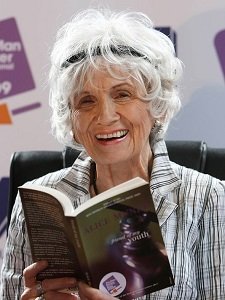
Her name appears in the news not for the first time – she already received the Man Booker International Prize for her literary work, and her style is often compared to that of another master of short story – Chekhov. It is interesting to mention that she is the first Canadian writer to receive the Nobel Prize for Literature for the entire duration of its existence (it was established in 1901), with a probable exception of Saul Bellow who won it in 1976. He, however, was only born in Canada but was raised in the United States, so it is more correct to call him an American writer rather than a Canadian one. Alice Munro is also the 13th woman to be honored with this award.
She is unusual in yet another respect – unlike the majority of Nobel Prize winners (and, in fact, the majority of writers in general), she almost exclusively writes in the short story form – not a trivial fit in a literary world, where it is extremely hard to make oneself noticeable unless you write novels or plays. She even said after receiving the award that she hopes it will help people see the short story as an important literary genre, not just something you play with until you have a novel published.
She has been writing short stories since 1950, and since then has been often praised for her fresh, witty and independent writing style. Since she started writing she published more than a dozen collections of short stories, usually choosing to write about the things she knew best – the lives of girls and women from her home region of southwestern Ontario. Comparisons with Chekhov come from the fact that the themes she touches upon are to a great degree similar to his – namely, the juxtaposition of quiet, uneventful life in provincial regions and hidden passions, dramas and heated conflicts.
Another interesting point is that earlier this year Alice Munro announced that she was no longer going to write fiction, explaining this by saying that she doesn’t have the energy she needs for it anymore. It is somewhat amusing because, when she spoke about her retirement, Ms. Munro mentioned that it was nice to feel just like everyone else again. After receiving the Nobel Prize, it is probably the last thing she can say about herself.
